Abridged Summary
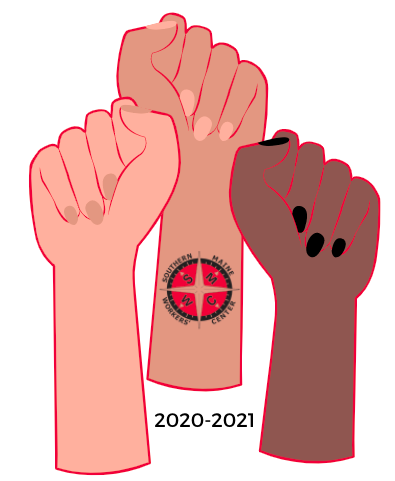
Click here to read en français!
The Southern Maine Workers’ Center is committed to putting working class and poor people first in all of our endeavors. We undertook this political economy study to help prioritize our efforts as we continue to build a strategic and transformative movement towards racial, economic, worker and gender justice.
Political economy is about looking at how society produces goods and services; asking: what are the things that get made, how are we exchanging goods and services, and how do these systems relate to political structures, policy, culture and ideology? This all matters because in our current conditions, “goods and services” include human rights like food, water, shelter, and healthcare. The political economy is about how our human rights are distributed and controlled. Political economy also considers how the economy impacts people in the process, especially how people are impacted differently along lines of race, class, and gender and what that means for Black, Indigenous, poor and working class people of color who are most familiar with systemic oppression.
Key ideas that guided our research include capitalism, western imperialism, capitalist patriarchy, white supremacy, neoliberalism, racial monopoly capitalism, and capitalism in crisis. Our research began with an analysis of these forces at the global scale, then moved towards the national and the local, taking note of patterns that repeat on multiple scales.
At the global scale, the key forces we observed include climate change, militarism and colonization, financialization, and the rise of the far right. Across the world, storms and natural disasters are longer and stronger due to climate change (see the poem, The end of the end of us, by Mia Dyson). The climate crisis is creating scarcity, increasing prices, and displacing communities of color and low-income communities from their homes. To address this crisis, workers must lead a Just Transition towards environmental justice and away from polluting industries such as the US military, the largest emitter of carbon emissions in the world. Militarism and the pursuit of empires worldwide exploits and destroys natural and human resources. Militarism and capitalism in the US mutually reinforce each other. Sometimes this is referred to as the military industrial complex (MIC), an “informal alliance between a nation’s military and the defense industry that supplies it, seen together as a vested interest which influences public policy.” The US’s current status as a world economic power began during World War I, driven by a desire to influence the global economy. The US has supported harmful dictatorships overtaking Indigenous people in Nicaragua, El Salvador, and more. Indigenous movements across the world disrupt the violence of military states by challenging the legitimacy of statehood on stolen land.
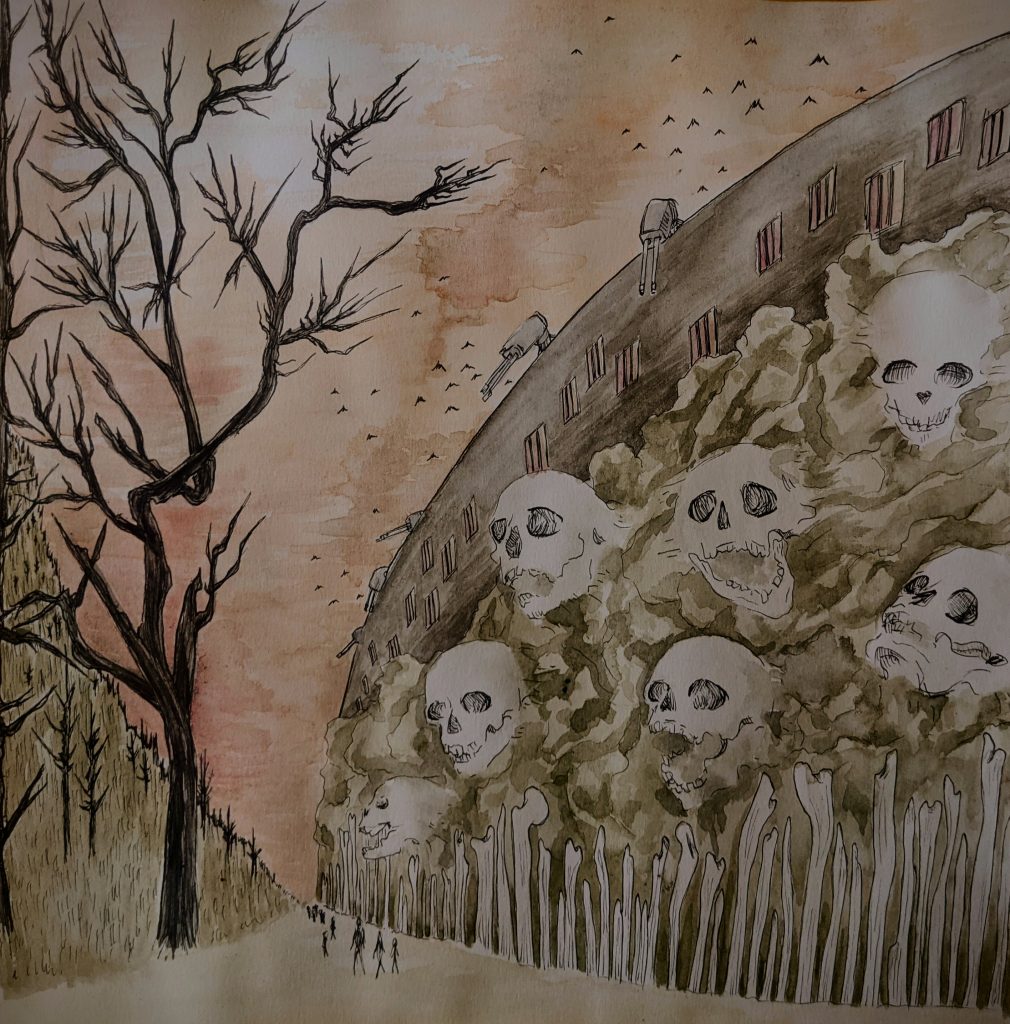
Militarism and climate crisis reinforce each other by destroying resources and creating scarcity. As a result, forced displacement is creating refugees and asylum seekers at a historic high. Looking back, it is clear that the US government used implausible but widely accepted arguments about national security and protecting the “free market” to justify “military coups, corporate plundering, and neoliberal sapping of resources.” This caused “the poverty, instability, and violence that now drives people from Guatemala, El Salvador, and Honduras toward Mexico and the United States. ” Today, “the world grapples with the intersections of draconian family separation and detention policies, dramatic disregard of refugee and migration rights, a stunning lack of compassion for people fleeing violence and conflict, and a global pandemic that has shown dramatic racial disparities and devastated Black and Brown communities internationally” (Black Alliance for Just Immigration).
The economy is about the exchange of goods and services that humans use to live… but the “real economy” has become threatened by the “financial economy,” which makes extreme profits for the global elite by playing prediction games with basic needs like water, housing, and oil. The finance sector gained dominant power during the financial crisis of the 1970s, the beginning of neoliberalism. When industrial workers in the US began organizing to win back the products of their labor, capitalists encouraged racist narratives to suppress these efforts. Racial monopoly capitalism depends on white supremacist ideas and a divided working class to justify the global harm it causes.
Racial capitalism, imperialism, and other global forces have shaped US history. Slavery, institutional racism and classism, and colonization were all important to the beginning of capitalism in the US. These forces nourished the far-right. Today, many far-right groups proffer their hateful ideology under the guise of patriotism and pride. We must be vigilant as to the true nature of the politicians who claim to have our best interests at heart, and fight for those interests ourselves.
The Black Lives Matter movement began in the US in 2013, powered by uprisings responding to the murder of Black people by police. In many cities, half the budget is dedicated to policing while crumbs are spent on essential social services. Many trace this back to the history of police as a tool to serve white property owners and brutalize Black Americans and other people of color. BLM and other movements point out that the US has never been a true democracy. Voter suppression and political polarization have prevented all of our voices from being heard meaningfully and impactfully.
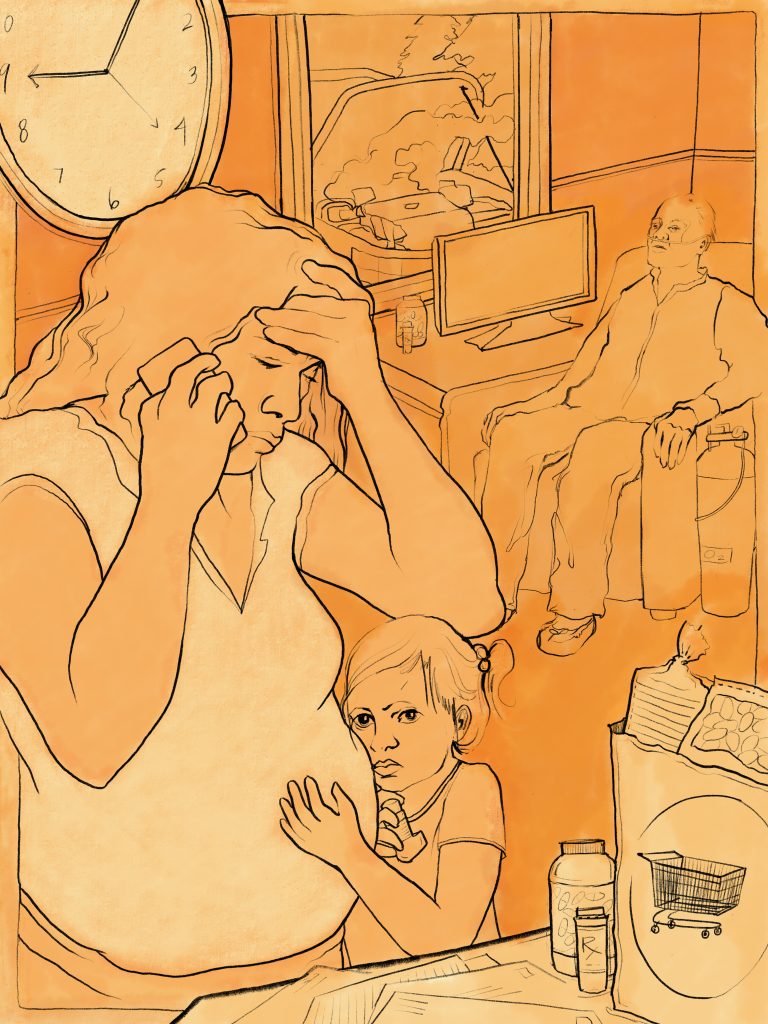
This begins to explain why so many of us are unsatisfied with the US healthcare system. Healthcare in the US is tied to productivity, the ideological assumption that one’s worth equals what one contributes to the system. Because of this, the US healthcare system is largely employment-based and centered around making sure people are healthy enough to work. COVID-19 exacerbated this situation with more than 5.4 million people losing their health insurance between February and May 2020. These same underlying dynamics are at play in the inequitable global COVID-19 vaccine rollout. The global elite is using patent rights to prioritize the insurance, pharmaceutical, and healthcare industries over people’s lives.
The nonprofit sector is often portrayed as more altruistic. But in reality, nonprofits are often tax havens for the rich, preachers of ruling class narratives, and surveillance tools used on organizers. Nonprofits can be effective vehicles for change– but pressure from foundations and the state can push them into compromising their missions.
Housing is another US industry that is being driven into the ground by profit motives. Global finance capital presents gentrification as development and improvement; this benefits the wealthy and pushes out long-time local residents. The issue of affordable housing is one of distribution, not of supply. Just as with every other facet of US society, the problem is ideological not material. Affordable housing must be framed as a human right. We must drive the solution, not the politicians who have been complicit in creating the problem in the first place.
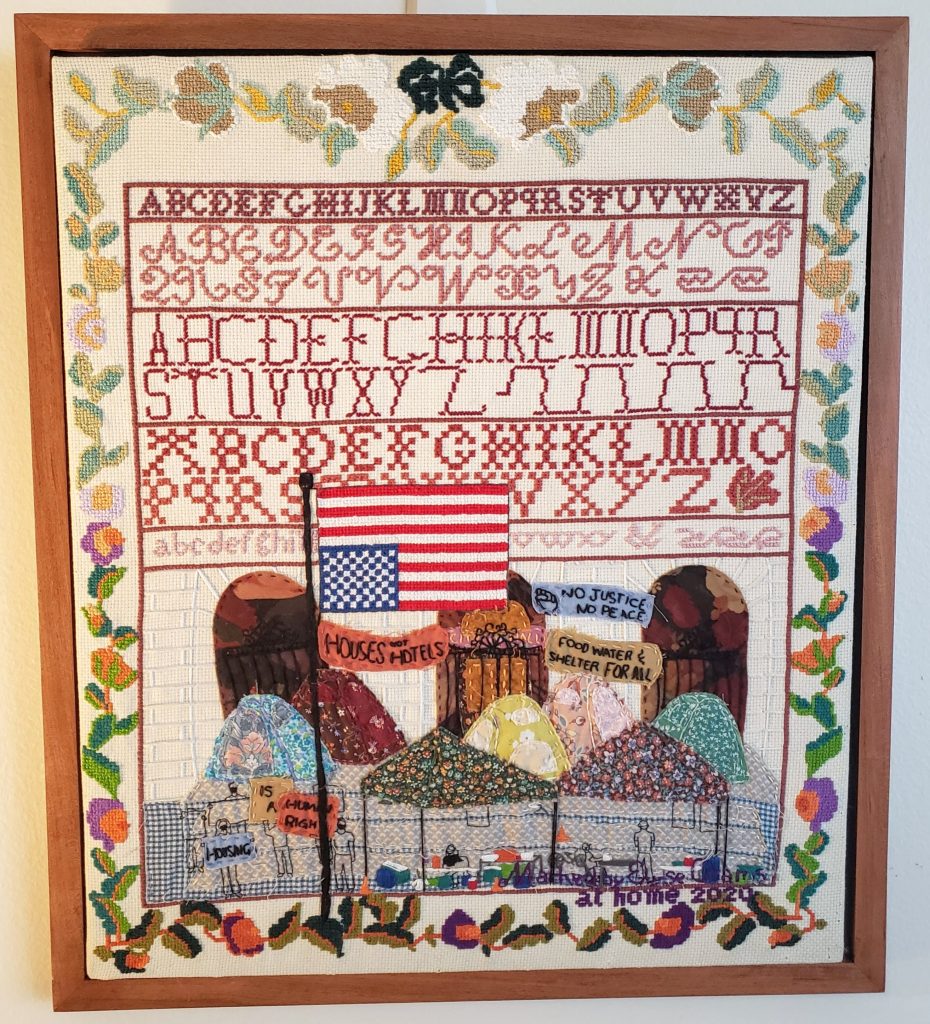
Since the US became a nation, colonization and white supremacy have controlled housing, land, and natural resources. In the modern “post-racial” era, these thefts have been normalized. While Indigenous communities demand their land back, white reformists think it is enough to hold performative land acknowledgements at the beginning of meetings. The US government’s purpose to destroy Indigenous sovereignty and wellbeing has gone largely unacknowledged by mainstream US Americans.
The US ‘s failed democracy has led to healthcare, nonprofits, housing, and more all being profit-driven industries. Even the education system runs like a business at the expense of both students and teachers. The US education system has become more private, expensive, and friendly to corporate business interests. An emphasis on marketable, memorizable skills comes at the expense of intellectual courage, critical thinking skills, and social studies. This is why our work to educate ourselves and each other about what’s going on in our world is so important–and starting local often helps…
Here in Maine, workers are very familiar with the forces that put profit over people and our environment. Indigenous people have long standing records of stewarding the land far more effectively. However, Maine has denied control over the land’s rich natural resources to the four tribes of the Wabanaki Confederacy. Wabanaki people have survived violent child-welfare practices, family separation, physical and cultural genocide, and continue to fight for the health of their people and this land. A massive percentage of land in Maine is privately owned by a small number of the world’s wealthiest people. Their focus on extracting fossil fuels, paper and lumber manufacturing, and other industrial practices have contaminated air and drinking water around the state.
When US economic policy made it cheaper for the rich to do business in the Global South, entire communities of Mainers lost their manufacturing jobs. The tourism economy took its place. Workers in the tourism service economy are often poorly compensated, and if summer tourism ever drops off (as it has during the pandemic), workers are left with very little support. The Maine Center for Economic Policy reports that “tens of thousands of Mainers have lost work during the pandemic”. The shortage of affordable housing has hit workers especially hard. Gentrification and AirBnB continue to drive rents up, despite the fact that 25% of housing in Maine is vacant.
Maine workers have shown incredible resilience through these obstacles. Only 17% of workers are represented by a union, but in 2020 alone 13,000 people joined one, bringing Maine’s union density to a 20 year high mark. This includes registered nurses at Maine Health, the state’s largest employer!
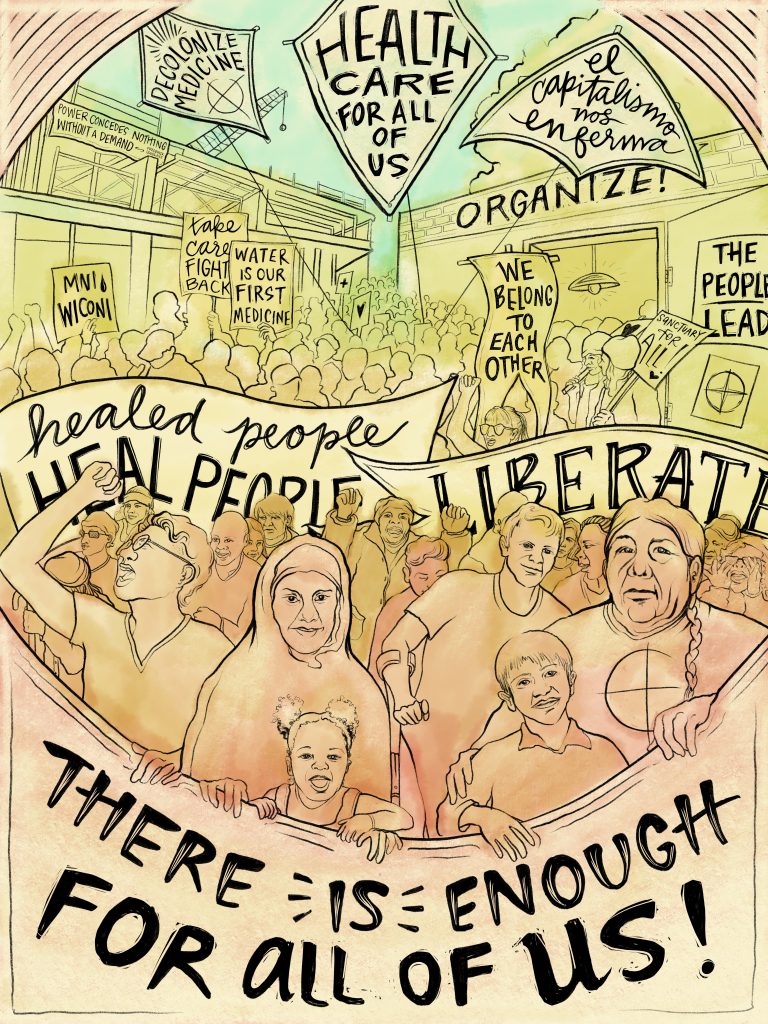
Countless people (especially Workers Center members and our communities), websites, journal articles, news reports, videos and books made this research possible. These findings inform SMWC’s priorities for action. If any of these topics resonate with you, check out our Political Economy Megasummary and a full list of sources.
To get a general overview of political economy and why it is important, we recommend reading our full report, The Political Economy Megasummary, as well as these key sources:
- Out to Win! Notes on the Road to 21st Century Socialism. Volume 1, February 2019. A publication of LeftRoots.
- Towards Land, Work, & Power co-authored by Jaron Browne, Marisa Franco, Jason Negron-Gonzalez, and Steve Williams. Copyright 2005 by the Amandla Project of People Organized to Win Employment Rights (POWER).
- Grassroots Global Justice’s analyses on grassroots feminism, demilitarization, and more. For example, The Global 1% and Their Private Army, 2012
- Just Transition: A Framework for Change by the Climate Justice Alliance
- Little Red School, Unit 3 Teaser: Robin Hood Theory presented by LeftRoots
- “Documented Not to Work,” Ruthie Gilmore. Critical Resistance 1997 Organizing Collective